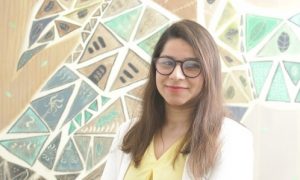Smrithi Mariam a student of the 2014 batch at RMLNLU has secured a Pre Placement Offer from Lexygen. We asked her to share her experiences and strategies she used over the years. In this interview she speaks about:
- Mooting and its benefits for a law student
- Preparing a C.V. and interviews
- Getting good internships and a pre-placement offer
Why did you decide to study Law? What inspired you to do so?
It took me a while to figure out what exactly I wanted to do after the 12th and being a science student I wrote all the possible engineering entrance exams. At the back of my head I knew that this wasn’t my thing and I began coaching for the CLAT. That’s when I realized that I could see myself as a lawyer and that most of all studying law would make me happy.
Do you have any lawyers in your family? Do you think having family members with a legal background help in this profession?
I’m a first generation lawyer, but I do have a lot of friends who have lawyers in their families and yes, I do think that it helps to have a family member in the profession to guide you in the and show you the how things work. But, on the other hand NOT having such a person means that you need to stand up for yourself, take charge, be resourceful and figure out the ropes on your own.
What are the extracurricular activities you took part at RML NLU?
Sport has always been an important part of my life and I’ve been a member of the college basketball team throughout my law school life. I have also taken part in Parliamentary Debates, I enjoying ‘JAM’ing, traditional debating and other literary events.
You have taken part in a lot of Moot Court Competitions in college, can you share a few mooting experiences?
My first national moot was the Nani Palkhivala National Tax Law Moot, I was in my third year and we finished runners up at the competition. This moot holds a very special place in my heart and I vividly remember the finals, where we argued in front of Bombay HC Judges on a matter that was actually pending at the ITAT. The finalists at this moot are awarded internships a top tier tax law firms in the country which is a bonus. I also took part in the Stetson International Environmental Law Moot and our team finished semifinalists at the world rounds and we secured speaker and memorial citations. Arguing against law students from schools in Poland, USA, Ireland, etc was enriching and being able to connect with them and exchange stories from our home towns was an unforgettable experience. In my final year I took part in the North India rounds of the Phillip C Jessup International Moot and was part of the team placed third. That was a bitter sweet end to our mooting life, so close yet so far!
Do you think mooting is beneficial for Law students or is it just to make your CV look fancy?
I love mooting and everything that comes with it. The crazy workload, the compulsory reading, the brain storming sessions, the sudden burst of energy when someone comes up with an argument, the list goes on. In my opinion, mooting helps you learn how to work in a team, how to keep your head together and work on a single matter for months together, how to logically work your way out of situations and come up with novel arguments and most importantly it allows you the freedom to learn and explore a new subject at your own pace without a project or an exam deadline breathing down your neck. Yes, mooting may make your CV look good but that’s not why you should take it up.
What are the law firms at which you interned? Which internships will you consider to be right at the top and why?
I have interned at JSA, AZB, AMSS, ELP, Trilegal, Samvad Partners and Lexygen. I enjoyed all my internships, but my stints at Samvad, Lexygen and ELP would be the ones I consider most enjoyable. The work environment, quality of work and most importantly the unbiased nature towards students from ‘lower rung’ law schools in these places really impressed me.
What was the procedure you followed to apply to these law firms?
Continuous emails to the HR of the firms and then follow up phone calls. It’s easier said than done and one has to listen to a number of rejections but it is possible. My college RCC also helped out with one internship.
What was the kind of work was allotted to you during your internships?
Work given to interns depends largely on the firm you are working with and their policy towards interns. Some firms trust interns with meaty assignments and allow them be a part of an ongoing client matter, while other firms hand out a lot of due diligence work. I have had my fair share of both types of work.
You secured a job with ‘Lexygen’ as a ‘PPO’. How many times have you interned there before? How was the experience of that internship (if you did one) and how was it different from other internships?
I have worked with Lexygen on two occasions for a total of 12 weeks. After short listing your CV they conduct a telephonic interview based on which they offer you the internship. The firm offers internships only to 4th and 5th year students strictly for the purpose of assessing whether they can be absorbed into the firm after they graduate. Lexygen is a great place to intern at; the firm ensures that interns are a part of weekly training sessions where the latest law or judgment on a particular subject is discussed. The intern has to make a presentation at the end of the internship period and there is continuous assessment of the work done; the intern receives feedback on the completion of every assignment.
What do you think an intern should accomplish during an internship in order to get a “call back”?
Get people to notice your work! There are no two ways about it. Many people seem to think that it is the people you get work from that make the difference, be that as it may, it is important to note that even if you are given work from a junior associate and you manage to impress them and continue to do so, a recommendation may be in the pipeline. A ‘call back’ also depends on a little bit of luck- being in the right place at the right time, etc. For example, interning when there are a large group of interns considerably lowers your chances of getting noticed as the work load splits among all of you.
Did you learn any skills while interning? What are these skills and how did you acquire them?
One skill that most law students acquire while interning is time management. More often than not interns are given a strict deadline by which they need to submit their work and managing your time is very important.
How do you think one should go about writing a CV when they are applying for a job?
I don’t think I should be an authority on the format of a CV but from what I have picked up, while applying for internships one must ensure that you change your CV as per the type of firm you are applying to. For example if you are applying to a Tax law firm highlight the tax work you have done at your internships or a paper you published in tax law journal, etc. Besides that, be clear, precise and to the point in your CV.
How did you go about preparing for your interview?
I was fortunate enough to secure the PPO without an official interview as I had been thoroughly assessed at both my internships. But in general for an interview be it for a job or for an internship knowing all the work that you have mentioned in your CV is the most important thing.
Do the law firms usually provide the candidates with an option to work with the teams of their choice while recruiting?
I understand that most law firms ask the candidate their area of interest, but there is no guarantee that you will be put in the team of your choice. It normally depends on the need of the firm and the vacancies available in their teams.
Many law students strongly believes that getting a job at one of the top 3 law firms is mostly about securing a high GPA. Would you agree?
Having a high GPA is important, but it is not the be all and end all of securing a job at a tier 1 firm. I personally know of people who have been placed at these firms with just above average grades. Especially in the case of PPOs, it is the quality of the work that you do and that is more important than your GPA.
What would be your advice to the law students aspiring to secure a job at top law firms? What do they need to do, how should they prepare in the last 3 years of law school?
As someone who is fresh out of law school, I do not feel competent to answer this question, but I will do my best by telling you my personal experience. Being in a law school that is not considered a ‘top’ one and wishing to secure a job in a ‘top’ law firm is hard but it is possible and I have seen it happen. Ensuring that you intern at the right time and making a mark at your internships can do wonders to your morale as well as your chances of getting a job.
Follow her on LinkedIn: Smrithi Mariam Punnoose


























